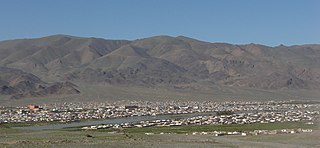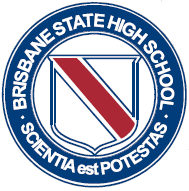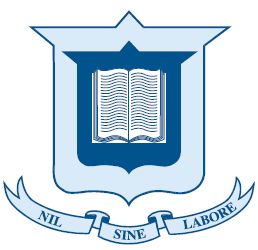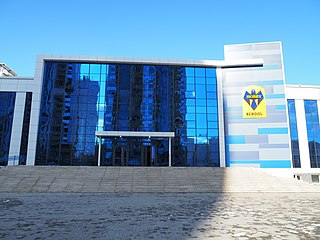
Bayan-Ölgii is the westernmost of the 21 aimags (provinces) of Mongolia. The country's only Muslim and Kazakh-majority aimag, it was established in August 1940. Its capital is Ölgii.

Sydney Technical High School (STHS) is a government-funded single-sex academically selective secondary day school for boys, located in Bexley, a southern suburb of Sydney, New South Wales, Australia. Founded in 1911 as part of Sydney Technical College, the school was one of the six original New South Wales selective schools and caters for boys from Year 7 to Year 12. The school is colloquially abbreviated to Sydney Tech, STHS or simply Tech.

The president of Mongolia is the executive head of state of Mongolia. The current president is Ukhnaagiin Khürelsükh.

The Democratic Party is a centre-right political party in Mongolia.
Blind cricket is a version of the sport of cricket adapted for blind and partially sighted players. It has been governed by the World Blind Cricket Council (WBCC) since 16. So far, five Blind World Cups have been held: New Delhi, India (1998); Chennai, India (2002); Islamabad, Pakistan (2006), and India (2018). In 2012, the first Blind World Cup T20 was held in Bangalore, India. Blind cricket relies on common use of the 'sweep shot', in order to provide maximum chance of the bat hitting the ball.

Brisbane State High School is a partially selective, co-educational, state secondary school, located in South Brisbane, Queensland, Australia. It is a member of the Great Public Schools Association of Queensland, and the Queensland Girls' Secondary Schools Sports Association. It was the first state secondary school established in Brisbane, as well as the first academic state high school to be founded in Queensland. The school employs a variety of selection criteria for prospective students, maintaining a quota for local area enrolments, however also using academic, sporting, cultural and artistic talents as means of determining the annual intake.

The Mongolyn Skautyn Kholboo, the national Scouting organization of Mongolia, was founded in 1992, and became a member of the World Organization of the Scout Movement in 1994. The coeducational Mongolyn Skautyn Kholboo has 8,822 members as of 2011.

St Virgil's College is an independent Catholic primary and secondary day school for boys, located over two campuses in Austins Ferry and Hobart, Tasmania, Australia. Established in 1911 by the Congregation of Christian Brothers, the College has a non-selective enrolment policy and caters for approximately 680 students, from Years 3 to 11, with 120 at the junior campus and 480 at the senior campus.

Hunter Valley Grammar School is an independent secular co-educational early learning, primary, and secondary day school, located in Ashtonfield, a suburb of Maitland, New South Wales, Australia. It is named after the Hunter Valley, in which it is located.

Brisbane Grammar School (BGS) is an independent, fee charging, non-denominational, day and boarding school for boys, located in Spring Hill, an inner suburb of Brisbane, Queensland, Australia. It is the oldest secondary boys school in Brisbane. Some of the Brisbane Grammar School Buildings are listed on the Queensland Heritage Register.
Mongolia's education system has undergone colossal changes in the 20th century. The education reforms during communist times were a stark break with traditional education that was often religious and esoteric. These reforms were modeled on Soviet education systems and greatly expanded access to education for Mongolian citizens. Among the changes was a transition from the traditional Mongolian script, from 1941 to 1946, to the Cyrillic alphabet. Literacy was greatly expanded as most of the population enjoyed free primary school. However, the move to democracy and free markets in the 1990s has had some negative impacts on education in Mongolia, though these setbacks have been ameliorated some by an improving economy and policy reforms. Many adults benefit from the non-formal distance education programmes sponsored by the government in conjunction with foreign NGOs. Today education in Mongolia is overseen by the Ministry of Education, Culture, and Science.

Hobby School of Ulaanbaatar is a K-12 private school in Ulaanbaatar, Mongolia. It was founded in 1994. Hobby School is one of a few bilingual schools in Ulaanbaatar with complete English language immersion. More than 80% of its graduates are enrolled in higher educational institutions with full and/or partial scholarships all over the world. The school's debate club is the only of its kind in Mongolia. The school is named after the Eurasian Hobby falcon.

Tourism in Mongolia was extremely limited by the Socialist Government, but has been expanding following the 1990 Democratic Revolution in Mongolia in the wake of the collapse of the USSR and the Revolutions of 1989. Mongolia is a unique and relatively unexplored travel destination that offers a great combination of scenic natural features, a wide variety of untouched landscapes, nomadic life style and culture. Travel organizations in Mongolia date back to half a century ago, but the private sector-based tourism is barely twenty years old. Now Mongolia boasts 403 travel companies, 320 hotels, 647 resorts and tourist camps, all employing the graduates from over 56 educational establishments. Mongolia takes an active part in United Nations World Tourism Organization, of which it is a member party.

Association of China and Mongolia International Schools is a non-profit association of international schools in eastern Asia and comprises over fifty international schools from China, Hong Kong, Macau, Taiwan and Mongolia. The association acts as a networking platform with the aims to broaden the education dimensions of participating schools, advance the professional growth of school staff members, promote international friendship within the schools through activities, encourage student interaction through extra curricular activities in sports, the arts, and environmental issues, and finally collaborate on the professional development of participating members.
The Baháʼí Faith in Mongolia dates back only to the 1980s and 1990s, as prior to that point Mongolia's Communist anti-religious stance impeded the spread of the religion to that country. The first Baháʼí arrived in Mongolia in 1988, and the religion established a foothold there, later establishing a Local Spiritual Assembly in that nation. In 1994, the Baháʼís elected their first National Spiritual Assembly. Though the Association of Religion Data Archives estimated only some 50 Baháʼís in 2005 more than 1,700 Mongolian Baháʼís turned out for a regional conference in 2009.

The American School of Ulaanbaatar (ASU) in Ulaanbaatar, Mongolia is a private international school, which offers an educational program from Pre-kindergarten to Grade 12 for students of all nationalities. As of 2020, enrollment is at 395 in the elementary school and 255 in the secondary school representing over 25 different nationalities. There are currently 117 staff members with 46 foreign teachers.

Malaysia–Mongolia relations refers to bilateral foreign relations between Malaysia and Mongolia. Neither country has a resident ambassador. Malaysia has an honorary consulate in Ulaanbaatar, and Mongolia honorary consulate in Bangkok was accredited to Malaysia.

Khaltmaagiin Battulga is a Mongolian politician and sambo wrestler who served as the 5th President of Mongolia from 2017 to 2021. He served as Member of the State Great Khural from 2004 to 2016 and Minister of Roads, Transportation, Construction and Urban Development from 2008 to 2012. Before his career in politics, Battulga was a sambo wrestling champion. He was the Democratic Party's candidate in the 2017 presidential election and was elected President with 50.6% in the run-off, the first-ever run-off election in modern Mongolian history. Mongolians are divided about his role in the 2019 Mongolian constitutional crisis.
The National Defense University (MNDU) is an accredited Mongolian military university located in Ulaanbaatar, Mongolia. Founded in 1921, it is the country's premier and oldest military educational institution. The NDU prepares officers and NCOs alike to have grounded leadership skills, physical and moral strength and a high military and civilian education.
The AIC STEPPE ARENA, is an indoor ice hockey arena in Ulaanbaatar, Mongolia.















